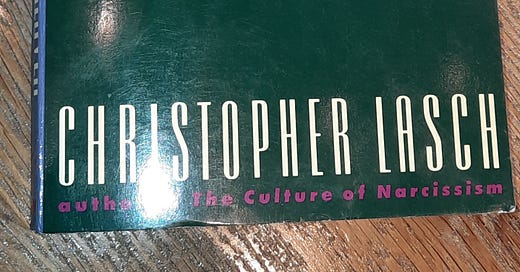What I read in July...
I can’t possibly do justice to the breadth of scholarship and depth of argument in Christopher Lasch’s The True and and Only Heaven, Progress and its Critics, in just a couple of sentences. Instead, I will settle for picking out a few reasons why I think this is the most important book I have read so far this year. Lasch made me question what I understand by ‘progress’ and whether it is always a positive aspiration. I’ve long been enthusiastic about scientific and technological progress but wary of proponents of social progress - ‘progressives’ who peddle ideas about gender identity, the family, racial thinking and the importance of being ‘on the right side of history’. Lasch made me question whether it is possible to draw such a sharp distinction between the two or whether progress and progressivism are linked in the worldview promoted by a technocratic ‘expert’ class. Lasch makes apparent the tensions between progress and tradition, between different social classes in a consumption-driven stage of capitalism, between populism and conservatism, and so much more. A lesson I always take from reading Lasch is that trends that might, on the surface, seem new, often have intellectual roots that stretch back very far indeed. He calls on us to take ourselves seriously, read more and know more.
In absolute complete and utter contrast is Caitlin Moran. I can confirm that What About Men? is as shockingly awful as critics have noted. Evidence that Moran exists in a bubble abounds. On one page she relays an anecdote told to her by her friend ‘Hugo’ and then, twenty pages later, tells us a different story about her fellow Times journalist Hugo Rifkind. These Hugos are, of course, one and the same. Moran is not pretending otherwise - but a little more self-awareness might have led her to realise that when you are writing about ‘men’ as a general category, knowing a few more who are not called Hugo and do not write for the Times would clearly help. What else annoys? The fact that barely two pages go by without shouty CAPITAL LETTERS, italics, or references to smoking make What About Men? seem like the diary of a teenager with her first boyfriend trying to work out what makes boys tick. I needed to shower after reading.
Sharron Davies takes herself much more seriously. Unfair Play is a great read. Davies has the science to back up differences between males and females when it comes to sports but also the moral arguments to show us why women’s sport it so important. Personally, I really enjoyed the early chapters where Davies describes her experiences competing against East German swimmers before the fall of the Berlin Wall. The injustice is highlighted without any self-pity; Davies shows us that the women doped with testosterone were as much victims as their western competitors. Her anger is directed at the officials who let such injustices happen - and who continue to allow women’s sport to be hijacked by male-bodied athletes today. Highly recommended.
Finally, I read The Scarlet Letter by Nathaniel Hawthorne. I loved this book. It’s a beautifully crafted tale of the power of maintaining dignity and a belief in the truth when confronted by a mob. Hawthorne shows that a worthwhile life comes with a commitment to your own sense of right and wrong rather than conforming to the demands of others.




